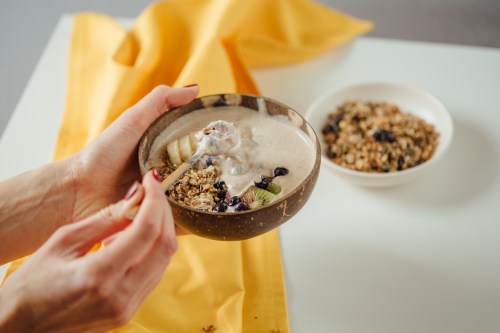These 7 Small Habits Can Have a Big Impact On Your Happiness
Why “micro-acts” are the way to go.

When you’re stressed out about everything that's happening—whether it's in your inner world or your external surroundings—it's easy to forget how to be happy. But happiness isn’t a given, so you have to make an intentional choice to pursue joy. While that can feel overwhelming, new research suggests you don’t need to make huge moves to infuse more happiness in your life; even seemingly tiny gestures can go a long way.
Experts in This Article
clinical associate professor of psychiatry at New York Presbyterian Hospital
clinical psychologist, associate professor at NYU Langone, and co-host of the Mind In View podcast
clinical psychologist at the Center for Anxiety & Women’s Emotional Wellness
assistant professor of Psychiatry and Behavioral Sciences at Vanderbilt University Medical Center
assistant professor in the Department of Psychology at Miami University
Of course, happiness and joy are an important part of your health. “It’s actually vital for our well-being,” says Darwin Guevarra, PhD, lead study author and an assistant professor in the Department of Psychology at Miami University. “When people feel joy, they tend to manage stress better, feel more connected to others, and find more meaning in everyday life. It’s one of those emotions that helps us bounce back and thrive, even when things are tough.”
Unfortunately, our brains tend to focus on the negative, says Aaron Brinen, PsyD, an assistant professor of psychiatry and behavioral sciences at Vanderbilt University Medical Center. “Oftentimes, we are really good at remembering all of the bad things that happen in our lives—every bad choice we make, we hold onto for weeks, months, and even years. But the good things float away like balloons,” he notes.
Given how vital happiness and joy are to your health, it’s kind of important to harness that feel-good power when you can, points out Thea Gallagher, PsyD, a clinical assistant professor at NYU Langone Health and a cohost of the Mind in View podcast. Luckily, some of that is in your control. “The lens through which we see the world is important,” Gallagher says.
Sure, you can’t really dictate what’s happening with global news or how other people interact with you at any given moment. But a new study suggests that you can make small moves to influence your own levels of joy and maybe even have a positive impact on the happiness of people around you. Here’s the deal.
What did the study find?
The study, which was published in the Journal of Medical Internet Research, recruited nearly 17,600 people across 169 countries and territories from 2022 to 2024. Participants were asked to follow a web-based weeklong well-being intervention called the Big Joy Project. The project took just five to 10 minutes out of the day, and it had a big impact, as the results show.
As part of the project, participants were asked to do daily micro-acts, like asking people to share a fun, inspiring, or proud moment, making a gratitude list, or doing something kind for another person.
After seven days, the researchers discovered that participants reported having higher levels of well-being and positive emotions, along with a stronger belief that their own behavior could support happiness. The participants also reported having lower stress levels and better sleep quality after the project ended.
The researchers also found that there was a clear link between how often people engaged in these acts. Turns out, people who did these microacts more often ended up having bigger gains in their overall happiness levels.
“It might sound simple, but doing something kind for someone else…shifts your attention away from your own stress and helps you feel more connected and purposeful. That’s a powerful combination,” Dr. Guevarra says.
7 habits that can boost happiness
Dr. Guevarra stresses that there’s not “one big fix” when it comes to increasing feelings of happiness. “What really matters is building in small moments that bring you joy,” he says. If you’re uncertain where to start, experts recommend considering the following strategies to support your happiness, and who knows, maybe even help the people you interact with regularly.
1. Write someone a thank you message
Dr. Guevarra explains that telling someone thank you is a good place to start. It can be as quick as texting a friend to thank them for listening when you needed someone to talk to the other day, or writing your mom a thank you note out of the blue for always being there. “It can actually give you a big emotional boost,” Dr. Guevarra says. “It shifts your attention away from your own stress and helps you feel more connected and purposeful.”
2. Look at the sky
It sounds simple, but when’s the last time you actually did it? Dr. Guevarra suggests “stepping outside for a few minutes of awe” and seeing where it gets you. You might find that the colors really calm you down, or the clouds make funny images that might make you laugh. “Really focus on these micro-acts that are readily available,” Dr. Brinen says. “You can do these all of the time.” And the best part? It doesn't take a whole lot of time either, so you're allowing yourself to feel joy even if your schedule is tight.
3. Smile at a stranger
It’s easy to look away or at your phone when someone is passing by you, but Dr. Brinen recommends looking at them and smiling instead. It can be infectious. “We’re pack animals. We have a natural desire to connect with other people and to feel part of a tribe,” he explains. “Connecting with other people, even with just a smile, triggers those parts of us that make us feel like we’re part of a bigger group.”
Gail Saltz, MD, clinical associate professor of psychiatry at New York Presbyterian Hospital Weill-Cornell School of Medicine, agrees. “Doing things for others increases feelings of purpose, meaning, and social connectedness,” she says. So the next time you're waiting in line at the post office or walking the aisles of a grocery store, a quick glance and smile at the stranger next to you might do you both some good.
4. Make a gratitude list
Coming up with things that you're thankful for doesn’t need to be anything major, and you can whip out a list in just a few minutes, Dr. Gallagher points out. “We tend to focus on what didn’t go so well on a given day, but it’s really helpful to focus on what did go well,” she says. “We tend to take those for granted.” If you’re stumped, she recommends thinking about things like your health or even something delicious that you ate today. “It actually helps,” she says.
5. Tell someone you’re grateful for them
Gratitude lists help you think about what you’re grateful for, but you can also pay it forward by telling someone in your life what you appreciate about them. Saying something like, “Hey, I’m really grateful we’re in this together” or “I’m so thankful for your help today” can go a long way, Dr. Gallagher says. Plus, it never hurts to share your appreciation for the people you love.
6. Try something new
Drinking a new type of coffee, walking a different way to work, trying a workout routine you've never done before at the gym—all of these can cause the release of feel-good hormones like dopamine and serotonin in the brain, Dr. Brinen says. It seems random and minor, but it’s actually not, Dr. Gallagher says. “These things don’t have to be major,” she says.
7. Do little acts of kindness
You might think that doing something kind for someone else benefits them, but it also benefits you—the giver. Small acts of kindness are exactly what they sound like: small. These can include quick and easy things like holding the door for someone else, says Hillary Ammon, PsyD, a clinical psychologist at the Center for Anxiety & Women’s Emotional Wellness.
“When working with people in therapy, I discuss the importance of balancing ‘purpose’ and ‘pleasure’ in their lives,” she says. Doing random acts of kindness for others helps to create a sense of purpose and pleasure for you, “ultimately creating a sense of joy,” she points out.
The bottom line
You don’t need to radically change your life to infuse a little more joy in your day-to-day, and it may take a few tries to find things that work for you. “The key is to experiment,” Dr. Guevarra says. “What works for me might not work for you, so try different things and see what actually lifts you up.” Over time, you'll develop a toolkit of strategies to try that help you feel better in moments where you could just use a little bit more joy.










